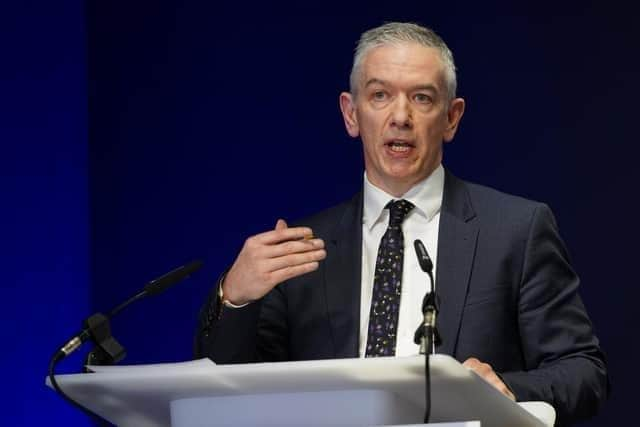Chief medical officer Gregor Smith advised colleagues to delete WhatsApps every day
Scotland’s chief medical officer advised colleagues to delete WhatsApp messages at the end of every day, the UK Covid Inquiry has heard.
Professor Sir Gregor Smith made the comment in a pandemic group chat after officials exchanged banter about cannabis.
Advertisement
Hide AdAdvertisement
Hide AdSir Gregor said his approach was in line with the Scottish Government’s official guidance, which says messages should be deleted regularly. The inquiry, which is sitting in Scotland for three weeks, previously heard Nicola Sturgeon failed to retain any WhatsApp messages “whatsoever” from during the Covid crisis.


This was met with outrage from opposition politicians, who called it a “shocking betrayal” of the people of Scotland.
Ms Sturgeon has since said she “was able to obtain copies” of messages, which were submitted to the inquiry last year.
Sir Gregor was asked about his approach to WhatsApp after the inquiry was shown messages from a group chat dating from July 2021, in which officials had been asked for any “hot topics” ahead of a call set to take place the following day.
Alison Strath, the chief pharmaceutical officer for Scotland, said: “Monoclonal antibodies, immunoglobulins, and wait for it… cannabis.”
Professor Graham Ellis, the deputy chief medical officer for Scotland, replied: “Yes please.”
John Harden, the deputy national clinical director, joked: “She keeps promising Graham, but never comes up with the goods!!”
Prof Ellis replied: “That’s why I have my own supply… Hope this isn’t FOI able?”
Advertisement
Hide AdAdvertisement
Hide AdSir Gregor responded: “Delete at the end of every day...” Prof Ellis then posted a crying-with-laughter emoji and a thumbs up.
During a hearing in Edinburgh on Monday, Jamie Dawson KC, counsel to the inquiry, asked Prof Smith: “Was it your practice to delete messages at the end of every day?”
The chief medical officer said: “The Scottish Government advice in relation to this was not to retain information for longer than it was necessary. It was to make sure that any information which was pertinent, as I say, any information, particularly discussions which ended up in a decision, was captured within the corporate systems.
"So my practice was to make sure that any information which was important in that way was then captured in email form on the system, was formally recorded so that there was an auditable trail. And I think you will see evidence of my approach to this within the conversations, and within other conversations, that I exhort other members of those conversations to do the same. But my practice was when information was no longer useful, it shouldn’t be retained.”
Pushed on whether he deleted messages at the end of every day, Sir Gregor said: “If not at the end of every day, then certainly on a frequent basis.”
He said he retained “any important decisions that were taken”, adding: “It wouldn’t be a verbatim account of a conversation, but it would be the essence of any decision or any approach we should be taking, or information that had been given.”
Sir Gregor said: “There was advice given to Scottish Government employees which specifically dealt with informal messaging, and the need to delete on a regular basis any information which was not relevant.”
He said there had also been reminders that official business should not be conducted on WhatsApp and that “there should be regular deletion, partly for security purposes”.
Advertisement
Hide AdAdvertisement
Hide AdSir Gregor said WhatsApp was largely used as a way to direct people towards pieces of information, or to arrange meetings.
Later, he was asked about the resignation of his predecessor, Catherine Calderwood, who stepped down in April 2020 after she was caught breaking lockdown rules to visit her holiday home in Fife.
Sir Gregor said the biggest impact this had was on the workload of those who remained. "We suddenly found ourselves with an important, trusted colleague who was no longer available there, who had developed relationships with ministers,” he said.
Scottish Conservative chairman Craig Hoy said: “Scots will be appalled that senior figures in the Scottish Government were effectively sneering at them during the Covid crisis. This shows the contempt those in charge felt towards ordinary people.
“We know this shocking culture of cover-up, and edicts to delete messages, came from the very top – Nicola Sturgeon and her senior SNP ministers. The nod-and-a-wink sniggering that went hand in hand with the industrial-scale deletion of messages points to the incriminating or embarrassing content contained within them.
“The SNP Government were shamefully pre-occupied with covering their own tracks through the deletion of messages, rather than focusing on protecting people from a deadly virus. Those responsible for such decision-making cannot continue to remain silent and must urgently explain their shameful, secretive and scandalous behaviour.”
Scottish Liberal Democrat leader Alex Cole-Hamilton MSP said: “While families grieved, the Scottish Government destroyed evidence of what was going on behind the scenes and behind the decisions which gripped all of our lives.
“It's disturbing to see some of Nicola Sturgeon’s closest advisers and officials joking about transparency and how to dodge it in the remnants of WhatsApp groups. From the First Minister downwards, there was a pattern of people covering their own backs and limiting what would be available to the inquiries everyone knew would follow.
Advertisement
Hide AdAdvertisement
Hide Ad“At Nicola Sturgeon’s helm, bereaved families may forever be denied the understanding, the justice and the closure they deserve. There are major questions for her to answer, and I hope that she will agree to make a personal statement in parliament to address them.”
Comments
Want to join the conversation? Please or to comment on this article.
